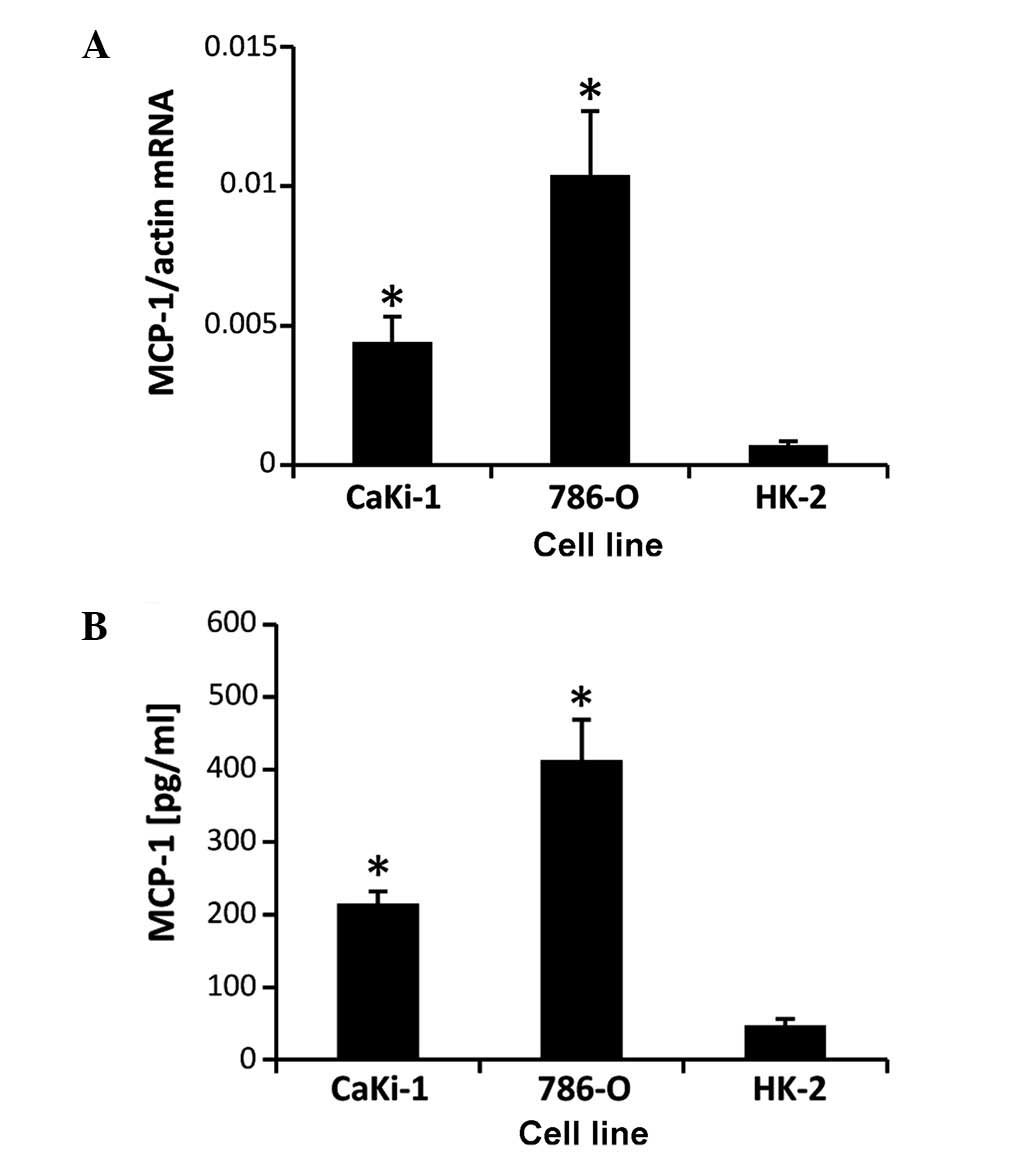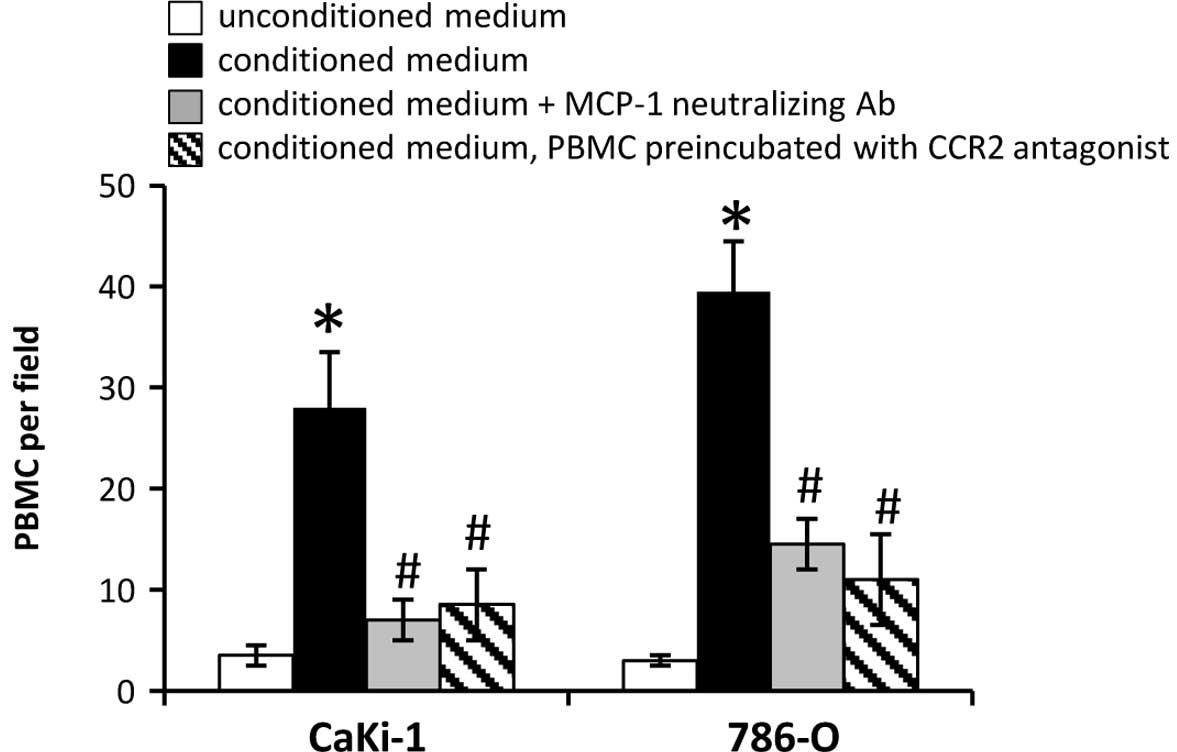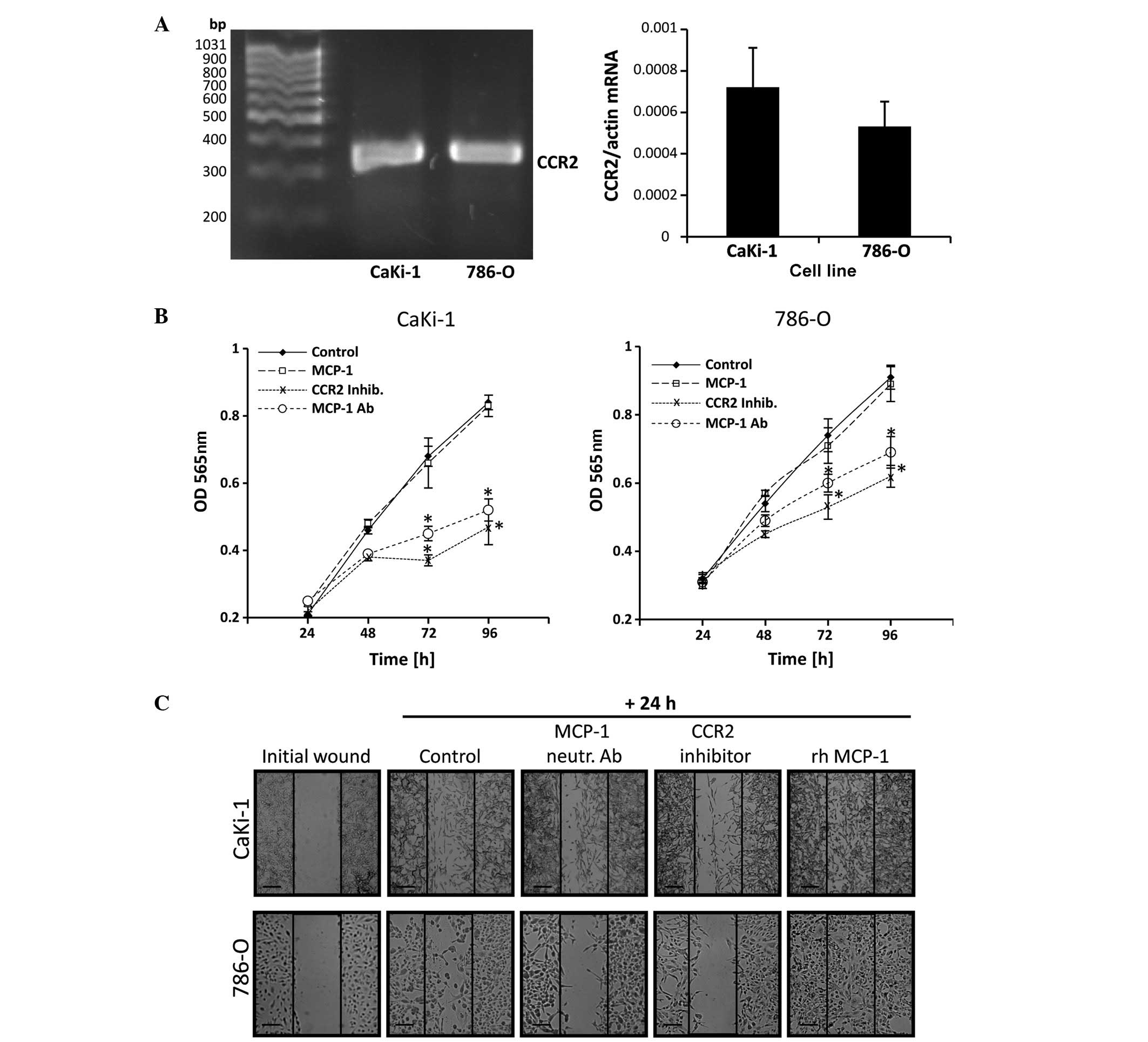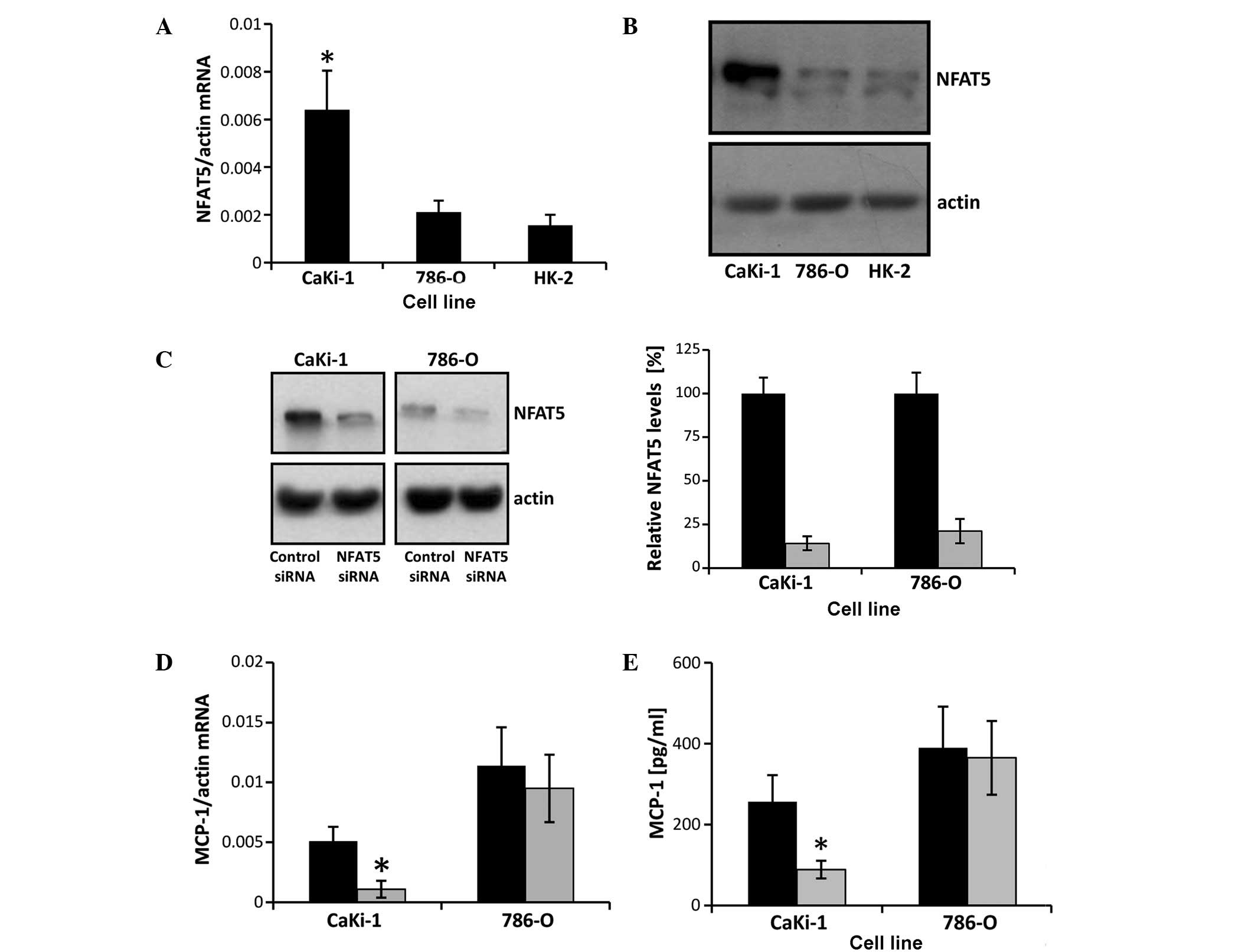|
1
|
Chow WH, Dong LM and Devesa SS:
Epidemiology and risk factors for kidney cancer. Nat Rev Urol.
7:245–257. 2010. View Article : Google Scholar : PubMed/NCBI
|
|
2
|
Linehan WM, Walther MM and Zbar B: The
genetic basis of cancer of the kidney. J Urol. 170:2163–2172. 2003.
View Article : Google Scholar : PubMed/NCBI
|
|
3
|
Patel PH, Chadalavada RS, Chaganti RS and
Motzer RJ: Targeting von Hippel-Lindau pathway in renal cell
carcinoma. Clin Cancer Res. 12:7215–7220. 2006. View Article : Google Scholar : PubMed/NCBI
|
|
4
|
Motzer RJ: New perspectives on the
treatment of metastatic renal cell carcinoma: An introduction and
historical overview. Oncologist. 16(Suppl 2): S1–S3. 2011.
View Article : Google Scholar
|
|
5
|
Balkwill F: Cancer and the chemokine
network. Nat Rev Cancer. 4:540–550. 2004. View Article : Google Scholar : PubMed/NCBI
|
|
6
|
Solinas G, Germano G, Mantovani A and
Allavena P: Tumor-associated macrophages (TAM) as major players of
the cancer-related inflammation. J Leukoc Biol. 86:1065–1073. 2009.
View Article : Google Scholar : PubMed/NCBI
|
|
7
|
Deshmane SL, Kremlev S, Amini S and Sawaya
BE: Monocyte chemoattractant protein-1 (MCP-1): An overview. J
Interferon Cytokine Res. 29:313–326. 2009. View Article : Google Scholar : PubMed/NCBI
|
|
8
|
Salcedo R, Ponce ML, Young HA, Wasserman
K, Ward JM, Kleinman HK, Oppenheim JJ and Murphy WJ: Human
endothelial cells express CCR2 and respond to MCP-1: Direct role of
MCP-1 in angiogenesis and tumor progression. Blood. 96:34–40.
2000.PubMed/NCBI
|
|
9
|
Weber KS, Nelson PJ, Gröne HJ and Weber C:
Expression of CCR2 by endothelial cells: Implications for MCP-1
mediated wound injury repair and in vivo inflammatory activation of
endothelium. Arterioscler Thromb Vasc Biol. 19:2085–2093. 1999.
View Article : Google Scholar : PubMed/NCBI
|
|
10
|
Ueno T, Toi M, Saji H, Muta M, Bando H,
Kuroi K, Koike M, Inadera H and Matsushima K: Significance of
macrophage chemoattractant protein-1 in macrophage recruitment,
angiogenesis, and survival in human breast cancer. Clin Cancer Res.
6:3282–3289. 2000.PubMed/NCBI
|
|
11
|
Negus RP, Stamp GW, Hadley J and Balkwill
FR: Quantitative assessment of the leukocyte infiltrate in ovarian
cancer and its relationship to the expression of C-C chemokines. Am
J Pathol. 150:1723–1734. 1997.PubMed/NCBI
|
|
12
|
Sanford DE, Belt BA, Panni RZ, Mayer A,
Deshpande AD, Carpenter D, Mitchem JB, Plambeck-Suess SM, Worley LA
and Goetz BD: Inflammatory monocyte mobilization decreases patient
survival in pancreatic cancer: A role for targeting the CCL2/CCR2
axis. Clin Cancer Res. 19:3404–3415. 2013. View Article : Google Scholar : PubMed/NCBI
|
|
13
|
Loberg RD, Ying C, Craig M, Yan L, Snyder
LA and Pienta KJ: CCL2 as an important mediator of prostate cancer
growth in vivo through the regulation of macrophage infiltration.
Neoplasia. 9:556–562. 2007. View Article : Google Scholar : PubMed/NCBI
|
|
14
|
Daurkin I, Eruslanov E, Stoffs T, Perrin
GQ, Algood C, Gilbert SM, Rosser CJ, Su LM, Vieweg J and Kusmartsev
S: Tumor-associated macrophages mediate immunosuppression in the
renal cancer microenvironment by activating the 15-lipoxygenase-2
pathway. Cancer Res. 71:6400–6409. 2011. View Article : Google Scholar : PubMed/NCBI
|
|
15
|
Ferrero E, Fabbri M, Poggi A, Galati G,
Bernasconi S and Zocchi MR: Tumor-driven matrix invasion by
infiltrating lymphocytes: Involvement of the alpha1 integrin
I-domain. Eur J Immunol. 28:2530–2536. 1998. View Article : Google Scholar : PubMed/NCBI
|
|
16
|
Kanno T, Kamba T, Yamasaki T, Shibasaki N,
Saito R, Terada N, Toda Y, Mikami Y, Inoue T, Kanematsu A, et al:
JunB promotes cell invasion and angiogenesis in VHL-defective renal
cell carcinoma. Oncogene. 31:3098–3110. 2012. View Article : Google Scholar : PubMed/NCBI
|
|
17
|
Yamasaki T, Kamba T, Kanno T, Inoue T,
Shibasaki N, Arakaki R, Yamada T, Kondo K, Kamoto T, Nishiyama H,
et al: Tumor microvasculature with endothelial fenestrations in VHL
null clear cell renal cell carcinomas as a potent target of
anti-angiogenic therapy. Cancer Sci. 103:2027–2037. 2012.
View Article : Google Scholar : PubMed/NCBI
|
|
18
|
Lu Y, Cai Z, Galson DL, Xiao G, Liu Y,
George DE, Melhem MF, Yao Z and Zhang J: Monocyte chemotactic
protein-1 (MCP-1) acts as a paracrine and autocrine factor for
prostate cancer growth and invasion. Prostate. 66:1311–1318. 2006.
View Article : Google Scholar : PubMed/NCBI
|
|
19
|
Li C, Liu B, Dai Z and Tao Y: Knockdown of
VEGF receptor-1 (VEGFR-1) impairs macrophage infiltration,
angiogenesis and growth of clear cell renal cell carcinoma (CRCC).
Cancer Biol Ther. 12:872–880. 2011. View Article : Google Scholar : PubMed/NCBI
|
|
20
|
Kojima R, Taniguchi H, Tsuzuki A, Nakamura
K, Sakakura Y and Ito M: Hypertonicity-induced expression of
monocyte chemoattractant protein-1 through a novel cis-acting
element and MAPK signaling pathways. J Immunol. 184:5253–5262.
2010. View Article : Google Scholar : PubMed/NCBI
|
|
21
|
Roth I, Leroy V, Kwon HM, Martin PY,
Féraille E and Hasler U: Osmoprotective transcription factor
NFAT5/TonEBP modulates nuclear factor-kappaB activity. Mol Biol
Cell. 21:3459–3474. 2010. View Article : Google Scholar : PubMed/NCBI
|
|
22
|
Küper C, Beck FX and Neuhofer W:
NFAT5-mediated expression of S100A4 contributes to proliferation
and migration of renal carcinoma cells. Front Physiol. 5:2932014.
View Article : Google Scholar : PubMed/NCBI
|
|
23
|
Livak KJ and Schmittgen TD: Analysis of
relative gene expression data using real-time quantitative PCR and
the 2(−Delta Delta C(T)) Method. Methods. 25:402–408. 2001.
View Article : Google Scholar : PubMed/NCBI
|
|
24
|
Mosmann T: Rapid colorimetric assay for
cellular growth and survival: Application to proliferation and
cytotoxicity assays. J Immunol Methods. 65:55–63. 1983. View Article : Google Scholar : PubMed/NCBI
|
|
25
|
Falk W, Goodwin RH Jr and Leonard EJ: A
48-well micro chemotaxis assembly for rapid and accurate
measurement of leukocyte migration. J Immunol Methods. 33:239–247.
1980. View Article : Google Scholar : PubMed/NCBI
|
|
26
|
Liang CC, Park AY and Guan JL: In vitro
scratch assay: A convenient and inexpensive method for analysis of
cell migration in vitro. Nat Protoc. 2:329–333. 2007. View Article : Google Scholar : PubMed/NCBI
|
|
27
|
Bradford MM: A rapid and sensitive method
for the quantitation of microgram quantities of protein utilizing
the principle of protein-dye binding. Anal Biochem. 72:248–254.
1976. View Article : Google Scholar : PubMed/NCBI
|
|
28
|
Laemmli UK: Cleavage of structural
proteins during the assembly of the head of bacteriophage T4.
Nature. 227:680–685. 1970. View
Article : Google Scholar : PubMed/NCBI
|
|
29
|
Conti I and Rollins BJ: CCL2 (monocyte
chemoattractant protein-1) and cancer. Semin Cancer Biol.
14:149–154. 2004. View Article : Google Scholar : PubMed/NCBI
|
|
30
|
Loberg RD, Day LL, Harwood J, Ying C, St
John LN, Giles R, Neeley CK and Pienta KJ: CCL2 is a potent
regulator of prostate cancer cell migration and proliferation.
Neoplasia. 8:578–586. 2006. View Article : Google Scholar : PubMed/NCBI
|
|
31
|
Schuler Y, Lee-Thedieck C, Geiger K,
Kaiser T, Ino Y, Aicher WK and Klein G: Osteoblast-secreted factors
enhance the expression of dysadherin and CCL2-dependent migration
of renal carcinoma cells. Int J Cancer. 130:288–299. 2012.
View Article : Google Scholar : PubMed/NCBI
|
|
32
|
Coleman RE: Clinical features of
metastatic bone disease and risk of skeletal morbidity. Clin Cancer
Res. 12(Suppl): S6243–S6249. 2006. View Article : Google Scholar
|
|
33
|
Nam JS, Kang MJ, Suchar AM, Shimamura T,
Kohn EA, Michalowska AM, Jordan VC, Hirohashi S and Wakefield LM:
Chemokine (C-C motif) ligand 2 mediates the prometastatic effect of
dysadherin in human breast cancer cells. Cancer Res. 66:7176–7184.
2006. View Article : Google Scholar : PubMed/NCBI
|
|
34
|
Wyler L, Napoli CU, Ingold B, Sulser T,
Heikenwälder M, Schraml P and Moch H: Brain metastasis in renal
cancer patients: Metastatic pattern, tumour-associated macrophages
and chemokine/chemoreceptor expression. Br J Cancer. 110:686–694.
2014. View Article : Google Scholar : PubMed/NCBI
|
|
35
|
Wang-Gillam A, Nywening TM, Sanford DE,
Lockhart AC, Suresh R, Tan BR, Lim KH, Sorscher S, Fowler K, Amin
MA, et al: Phase IB study of FOLFIRINOX plus PF-04136309 in
patients with borderline resectable and locally advanced pancreatic
adenocarcinoma (PC). J Clin Oncol. 33(Suppl; Abstract
388)2015.PubMed/NCBI
|
|
36
|
Vivanco I and Sawyers CL: The
phosphatidylinositol 3-Kinase AKT pathway in human cancer. Nat Rev
Cancer. 2:489–501. 2002. View
Article : Google Scholar : PubMed/NCBI
|
|
37
|
Qian Y, Corum L, Meng Q, Blenis J, Zheng
JZ, Shi X, Flynn DC and Jiang BH: PI3K induced actin filament
remodeling through Akt and p70S6K1: Implication of essential role
in cell migration. Am J Physiol Cell Physiol. 286:C153–C163. 2004.
View Article : Google Scholar : PubMed/NCBI
|
|
38
|
Miyakawa H, Woo SK, Chen CP, Dahl SC,
Handler JS and Kwon HM: Cis- and trans-acting factors regulating
transcription of the BGT1 gene in response to hypertonicity. Am J
Physiol. 274:F753–F761. 1998.PubMed/NCBI
|
|
39
|
Miyakawa H, Woo SK, Dahl SC, Handler JS
and Kwon HM: Tonicity-responsive enhancer binding protein, a
rel-like protein that stimulates transcription in response to
hypertonicity. Proc Natl Acad Sci USA. 96:2538–2542. 1999.
View Article : Google Scholar : PubMed/NCBI
|
|
40
|
Zhang Z, Ferraris JD, Brooks HL, Brisc I
and Burg MB: Expression of osmotic stress-related genes in tissues
of normal and hyposmotic rats. Am J Physiol Renal Physiol.
285:F688–F693. 2003. View Article : Google Scholar : PubMed/NCBI
|
|
41
|
Woo SK, Lee SD, Na KY, Park WK and Kwon
HM: TonEBP/NFAT5 stimulates transcription of HSP70 in response to
hypertonicity. Mol Cell Biol. 22:5753–5760. 2002. View Article : Google Scholar : PubMed/NCBI
|
|
42
|
Han KH, Woo SK, Kim WY, Park SH, Cha JH,
Kim J and Kwon HM: Maturation of TonEBP expression in developing
rat kidney. Am J Physiol Renal Physiol. 287:F878–F885. 2004.
View Article : Google Scholar : PubMed/NCBI
|
|
43
|
López-Rodriguez C, Aramburu J, Jin L,
Rakeman AS, Michino M and Rao A: Bridging the NFAT and NF-kappaB
families: NFAT5 dimerization regulates cytokine gene transcription
in response to osmotic stress. Immunity. 15:47–58. 2001.PubMed/NCBI
|
|
44
|
Esensten JH, Tsytsykova AV,
Lopez-Rodriguez C, Ligeiro FA, Rao A and Goldfeld AE: NFAT5 binds
to the TNF promoter distinctly from NFATp, c, 3 and 4, and
activates TNF transcription during hypertonic stress alone. Nucleic
Acids Res. 33:3845–3854. 2005. View Article : Google Scholar : PubMed/NCBI
|
|
45
|
Zhong L, Peng X, Hidalgo GE, Doherty DE,
Stromberg AJ and Hirschowitz EA: Identification of circulating
antibodies to tumor-associated proteins for combined use as markers
of non-small cell lung cancer. Proteomics. 4:1216–1225. 2004.
View Article : Google Scholar : PubMed/NCBI
|
|
46
|
Mijatovic T, Mathieu V, Gaussin JF, De
Nève N, Ribaucour F, Van Quaquebeke E, Dumont P, Darro F and Kiss
R: Cardenolide-induced lysosomal membrane permeabilization
demonstrates therapeutic benefits in experimental human non-small
cell lung cancers. Neoplasia. 8:402–412. 2006. View Article : Google Scholar : PubMed/NCBI
|
|
47
|
Levy C, Khaled M, Iliopoulos D, Janas MM,
Schubert S, Pinner S, Chen PH, Li S, Fletcher AL, Yokoyama S, et
al: Intronic miR-211 assumes the tumor suppressive function of its
host gene in melanoma. Mol Cell. 40:841–849. 2010. View Article : Google Scholar : PubMed/NCBI
|
|
48
|
McCarthy-Keith DM, Malik M, Britten J,
Segars J and Catherino WH: Gonadotropin-releasing hormone agonist
increases expression of osmotic response genes in leiomyoma cells.
Fertil Steril. 95:2383–2387. 2011. View Article : Google Scholar : PubMed/NCBI
|
|
49
|
Germann S, Gratadou L, Zonta E, Dardenne
E, Gaudineau B, Fougère M, Samaan S, Dutertre M, Jauliac S and
Auboeuf D: Dual role of the ddx5/ddx17 RNA helicases in the control
of the pro-migratory NFAT5 transcription factor. Oncogene.
31:4536–4549. 2012. View Article : Google Scholar : PubMed/NCBI
|
|
50
|
Jauliac S, López-Rodriguez C, Shaw LM,
Brown LF, Rao A and Toker A: The role of NFAT transcription factors
in integrin-mediated carcinoma invasion. Nat Cell Biol. 4:540–544.
2002. View
Article : Google Scholar : PubMed/NCBI
|
|
51
|
Chen M, Sinha M, Luxon BA, Bresnick AR and
O'Connor KL: Integrin alpha6beta4 controls the expression of genes
associated with cell motility, invasion, and metastasis, including
S100A4/metastasin. J Biol Chem. 284:1484–1494. 2009. View Article : Google Scholar : PubMed/NCBI
|
|
52
|
Chen M, Sastry SK and O'Connor KL: Src
kinase pathway is involved in NFAT5-mediated S100A4 induction by
hyperosmotic stress in colon cancer cells. Am J Physiol Cell
Physiol. 300:C1155–C1163. 2011. View Article : Google Scholar : PubMed/NCBI
|
|
53
|
Alvarez-Diaz S, Valle N, Ferrer-Mayorga G,
Lombardía L, Herrera M, Domínguez O, Segura MF, Bonilla F, Hernando
E and Muñoz A: MicroRNA-22 is induced by vitamin D and contributes
to its antiproliferative, antimigratory and gene regulatory effects
in colon cancer cells. Hum Mol Genet. 21:2157–2165. 2012.
View Article : Google Scholar : PubMed/NCBI
|
|
54
|
Slattery ML, Lundgreen A, Bondurant KL and
Wolff RK: Tumor necrosis factor-related genes and colon and rectal
cancer. Int J Mol Epidemiol Genet. 2:328–338. 2011.PubMed/NCBI
|
|
55
|
Remo A, Simeone I, Pancione M, Parcesepe
P, Finetti P, Cerulo L, Bensmail H, Birnbaum D, Van Laere SJ,
Colantuoni V, et al: Systems biology analysis reveals NFAT5 as a
novel biomarker and master regulator of inflammatory breast cancer.
J Transl Med. 13:1382015. View Article : Google Scholar : PubMed/NCBI
|
|
56
|
Li JT, Wang LF, Zhao YL, Yang T, Li W,
Zhao J, Yu F, Wang L, Meng YL, Liu NN, et al: Nuclear factor of
activated T cells 5 maintained by Hotair suppression of miR-568
upregulates S100 calcium binding protein A4 to promote breast
cancer metastasis. Breast Cancer Res. 16:4542014. View Article : Google Scholar : PubMed/NCBI
|
|
57
|
Lubarski I, Asher C and Garty H: FXYD5
(dysadherin) regulates the paracellular permeability in cultured
kidney collecting duct cells. Am J Physiol Renal Physiol.
301:F1270–F1280. 2011. View Article : Google Scholar : PubMed/NCBI
|
|
58
|
Lubarski I, Pihakaski-Maunsbach K, Karlish
SJ, Maunsbach AB and Garty H: Interaction with the Na,K-ATPase and
tissue distribution of FXYD5 (related to ion channel). J Biol Chem.
280:37717–37724. 2005. View Article : Google Scholar : PubMed/NCBI
|
|
59
|
Lim SW, Ahn KO, Sheen MR, Jeon US, Kim J,
Yang CW and Kwon HM: Downregulation of renal sodium transporters
and tonicity-responsive enhancer binding protein by long-term
treatment with cyclosporin A. J Am Soc Nephrol. 18:421–429. 2007.
View Article : Google Scholar : PubMed/NCBI
|
|
60
|
Jeon US, Han KH, Park SH, Lee SD, Sheen
MR, Jung JY, Kim WY, Sands JM, Kim J and Kwon HM: Downregulation of
renal TonEBP in hypokalemic rats. Am J Physiol Renal Physiol.
293:F408–F415. 2007. View Article : Google Scholar : PubMed/NCBI
|
|
61
|
Neuhofer W, Woo SK, Na KY, Grunbein R,
Park WK, Nahm O, Beck FX and Kwon HM: Regulation of TonEBP
transcriptional activator in MDCK cells following changes in
ambient tonicity. Am J Physiol Cell Physiol. 283:C1604–C1611. 2002.
View Article : Google Scholar : PubMed/NCBI
|
|
62
|
Küper C, Beck FX and Neuhofer W: NFAT5
contributes to osmolality-induced MCP-1 expression in mesothelial
cells. Mediators Inflamm. 2012:5130152012. View Article : Google Scholar : PubMed/NCBI
|


















